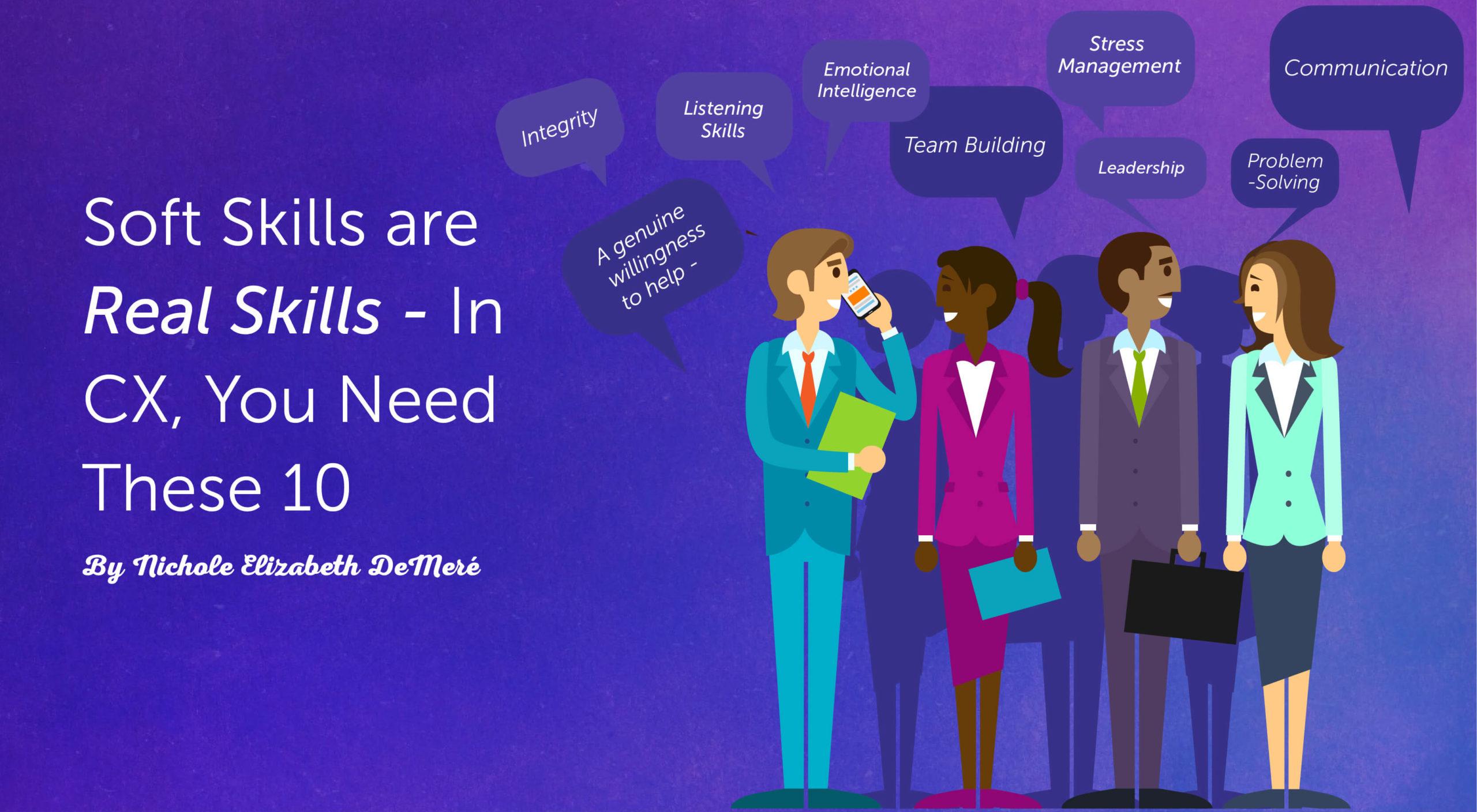Soft Skills are Real Skills – In CX, You Need These 10

“Soft skills” have traditionally been undervalued, and that’s slow to change. But more companies are realizing their worth. And even if the skills themselves are difficult to quantify (how much more likeable is Job Applicant A than Job Applicant B?), their effects aren’t.
The soft skills CX professionals possess directly affect metrics like:
- Net promoter scores
- Customer satisfaction scores
- Customer effort scores
- Qualitative survey feedback on customer support interactions
- Qualitative data gleaned from online customer reviews
- Number of referrals and recommendations
Human-to-human interactions can make or break those scores, generate referrals or cancellations, and either fuel word-of-mouth growth or silence it.
But before you break out your old copy of Dale Carnegie’s How to Win Friends and Influence People (a classic for a reason), I’d like to talk about why I’m reading more articles now on “soft skills” as they apply to customer service, customer success, and customer experience.
Because we need them more now than ever.
“So let’s uncomfortably call them real skills instead.
Real because they work, because they’re at the heart of what we need to today.
Real because even if you’ve got the vocational skills, you’re no help to us without these human skills, the things that we can’t write down, or program a computer to do.”
– Seth Godin, Let’s stop calling them ‘soft skills’, Medium
What Exactly Are Soft Skills?
Often referred to as “people skills,” ‘soft skills’ don’t have a hard definition. In fact, they’re remarkably hard to pin down.
If you try to define these skills with a list of what they entail, you’ll run into trouble. Everyone has their own set.
Some argue that part of the definition of ‘soft skills’ is that they are something you’re born with. But others, including Seth Godin, say that’s “crazy because infants aren’t good at any of the soft skills. Of course, we learn them.”
(When was the last time you met a baby with a good work ethic?)
Seth Godin calls for five categories of ‘soft’ skills: Self Control, Productivity, Wisdom, Perception, and Influence.
Others cite the ability to listen, accept feedback, and communicate effectively. Or qualities like charisma, empathy, friendliness, patience, and reliability. Problem-solving skills get thrown into the mix with teamwork and attentiveness.
I like this exhaustive list from the balance which offers 6 categories of soft skills with sub-lists of specific skills under each. Their categories are:
- Communication skills
- Critical thinking
- Leadership
- Positive attitude
- Teamwork
- Work ethic
But even those don’t make it into “The Five Soft Skills Recruiters Want Most” that made it into the eponymous Fast Company article. Those were: Problem solving, adaptability, time management, organization and oral communication.
In 2013, Google tested its hiring hypothesis that prioritized top grades from elite universities in STEM subjects. They found that, in practice, the eight most important qualities of Google’s top managers were:
- Ability to be a good coach.
- Willingness to empower, rather than micromanage.
- Taking an interest in people’s success and well-being.
- Ability to be productive and results-oriented.
- Communication and listening skills.
- Willingness to help employees develop their careers.
- Holding a clear vision and developing a strategy for the team.
- Possessing key technical skills that allow the manager to advise the team.
Technical skills came in dead last. The rest were ‘soft skills.’
For our purposes, I’d like to simplify the definition of these skills and stop calling them “soft” – period. Let’s call them “people skills.”
People skills are what you need to relate to people, be understood, and be liked. Likeability is one word that encompasses myriad characteristics, including charisma, reliability, empathy, and willingness to take a stab at solving problems. Above all, we’re talking about genuinely caring about people.
If you get that one thing right – you’ve already got the core soft skills you need.
Relationships Can Make Or Break a Business
Businesses are rising and falling based on the quality of their relationships with their customers – and employees.
For subscription-based services in general, and SaaS in particular, success metrics like retention, customer lifetime value and cost-to-acquire are all correlated with how well businesses relate to, and engage with, their customers.
These are people skills.
And as artificial intelligence is taking over so many of the human-to-human interactions businesses have traditionally had with their customers, the human interactions that do happen are coming under more scrutiny.
In Top Customer Service Trends for 2018 by Kate Leggett, Vice President and Principal Analyst at Forrester, Kate points out the repercussions of increasing AI and self-service in customer service.
“With customers increasingly using self-service, there are fewer opportunities for engagement with agents who can lend a human touch.”
That means three things: Those fewer opportunities are under more pressure to produce positive results, human-to-human interactions will be reserved for bigger problems that AI can’t handle, and those complex issues will require both accurate diagnoses and empathy.
“These organizations will focus on the quality of interactions as measured by customer retention and lifetime value. Agents will need to be more highly skilled and better compensated. Old management principles that focused on efficiency must be relaxed. Ultimately, technologies such as quality monitoring should be replaced by customer feedback.”
As companies race to differentiate themselves based on customer experience, these interactions become vitally important.
“Forget about your company’s historical point of differentiation. Customer Experience reigns supreme today and you will either be rewarded or punished for how you are treating your customers.”
– Bill Carmody, founder & CEO of Trepoint, “Customer Experience is Your ONLY Differentiator. You’re About To Be Rewarded or Punished”, Inc.
With hundreds of “soft skills” listed, it might seem like a lifetime’s worth of study for anyone who isn’t confident in their natural gifts of gab. Yes, you can learn people skills. You can certainly improve them. And to really make an impact on CX, you and your customer support or customer success team may have to. So let’s concentrate on the skills that make the most impact.
The 10 People Skills You Need Most for CX
- A genuine willingness to help – Not only does a genuine willingness to help make customer support agents shine and customer success managers effective, this instinct to solve problems and make positive impacts bleeds into other areas as well. For example, a customer success agent who becomes aware of a problem through customer feedback can patch the issue – or the agent can investigate the problem and actively work with other teams to bridge that success gap for everyone, strengthening the product or service and the company as a whole.
- Empathy – Customer support professionals are often trained to “show empathy” by repeating phrases that come off as insincere at best: “I understand that this can be frustrating.” Empathy phrases can be incredible tools (this is a very good list), but only when used with discretion (so it doesn’t sound like you’re reading off of a card). But empathy is about more than the words you use. It’s the desire to really understand where someone else is coming from and what they need to thrive. That’s Customer Success 101, right there: Taking the time to learn about your customer’s business and challenges so you can understand your product from their perspective.
- Communication – Communication skills, the ability to listen carefully, explain clearly and treat kindly are must-haves in the People Skills toolkit, but there’s another type of communication customer service and success teams should have: Cross-communication. You’re at the nexus between your customers and your business which puts you in a unique position to gather data customer sentiment, use, and engagement that everyone else in your business needs. Make sure they get that info.
- Emotional Intelligence – Connected to empathy in that you’re aware of other people’s emotions, Emotional Intelligence also means you’re aware of your own. It’s self and social awareness of mood, emotional strengths and weaknesses, and potential underlying motivations behind behavior. In practice, this means knowing when to praise team members and how to constructively criticize. With customers, often it’s about understanding how your actions and responses can positively affect their moods to create memorable experiences.
- Integrity – Managing expectations by honestly telling customers what they can and can’t expect builds a tremendous amount of trust and sets customers up to have positive experiences when businesses don’t overpromise. Being able to set expectations also builds trust with internal teams.
- Problem-Solving – The best problem-solvers are the ones who jump in as soon as they see a rough patch arise and have enough confidence to figure it out if a solution doesn’t immediately present itself. Really, it’s all in the attitude. You don’t have to know the answer to everything to help. You just have to be willing to figure out the answer that’s needed.
- Stress Management – Dealing with people, even lovely coworkers and customers – is inherently stressful to most humans. The ability to manage that stress and not take it out on those around you is one of the best ‘People Skills’ you can cultivate. One bad day can lose a lot of clients when you think in terms of not just the client you’re speaking to, but all of the future clients they can bring in with recommendations.
- Listening Skills – This is one everyone in the company, from the Founder on down, needs to have, because listening to your customers effectively, focusing on their needs and desires (instead of your needs), is how great products and companies are built. More than that, though, is the willingness to listen internally as well – to people from different departments who often have valuable insights to add.
- Leadership – Once you uncover a good idea or customer feedback that requires action, it’s a real skill to be able to inspire others to follow your lead (especially if those others are above you). This becomes easier when you work from the mentality that your role is to make those you lead wildly successful. Everyone wants to follow a leader who gives them what they need to do their best work and get the best results.
- Team Building – Team building across departments brings leadership to a whole new level. Reaching out and forming relationships with people in other departments is something anyone can initiate. And when you approach your co-workers with an open willingness to help and collaborate, you won’t get turned down.
What “soft skills” – or People Skills – do you see the most need for in CX?
Be the customer experience champion at your company. Sign up today for free Net Promoter Score, CSAT or Customer Effort Score feedback with Pearl-Plaza.





